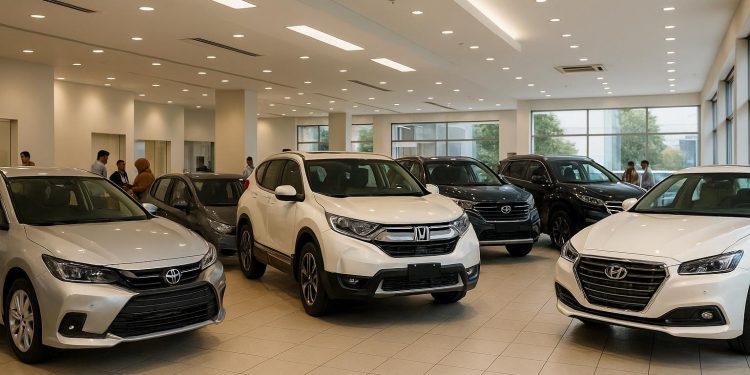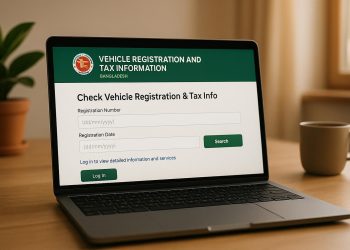Bangladesh’s car market is booming, driven by urbanization, rising incomes, and limited public transport options. Toyota leads with an 86% market share, followed by Honda (5%), Nissan (3%), Mitsubishi, and Hyundai (1% each). Reconditioned cars dominate, making up 59% of listings, with Toyota being the most trusted choice due to reliability and resale value. SUVs and hybrids are gaining traction, reflecting shifting buyer preferences. Here’s a quick breakdown:
- Toyota: Dominates with a vast lineup, reliability, and resale value. Popular models include Corolla (৳25–35 lakh) and Vitz (৳13 lakh).
- Honda: Known for durability and features. Models like Civic (৳42–52 lakh) and HR-V (৳35–45 lakh) attract urban buyers.
- Nissan: Offers tech-forward options like Almera (৳30 lakh) and X-Trail (৳58–60 lakh).
- Mitsubishi: Focuses on SUVs and MPVs, with models like Xpander (৳32–46 lakh) and Outlander (৳49–50 lakh).
- Hyundai: Affordable and modern, with locally assembled models like Creta (৳35–36 lakh) reducing costs.
Quick Comparison:
| Brand | Market Share | Popular Models | Price Range (৳) | Key Strengths |
|---|---|---|---|---|
| Toyota | 86% | Corolla, Vitz, Aqua | 13–300 lakh | Reliability, resale |
| Honda | 5% | Civic, HR-V, CR-V | 25–89 lakh | Durability, features |
| Nissan | 3% | Almera, X-Trail | 30–60 lakh | Tech, comfort |
| Mitsubishi | 1% | Xpander, Outlander | 23–62 lakh | SUVs, safety |
| Hyundai | 1% | Creta, Tucson, Elantra | 30–95 lakh | Affordability |
Toyota remains the go-to choice, but brands like Hyundai and Honda are gaining ground with competitive features and pricing. The market is evolving, with hybrids and SUVs shaping the future.
Top 10 Most Popular Car in Bangladesh – Most popular Car in Dhaka
1. Toyota
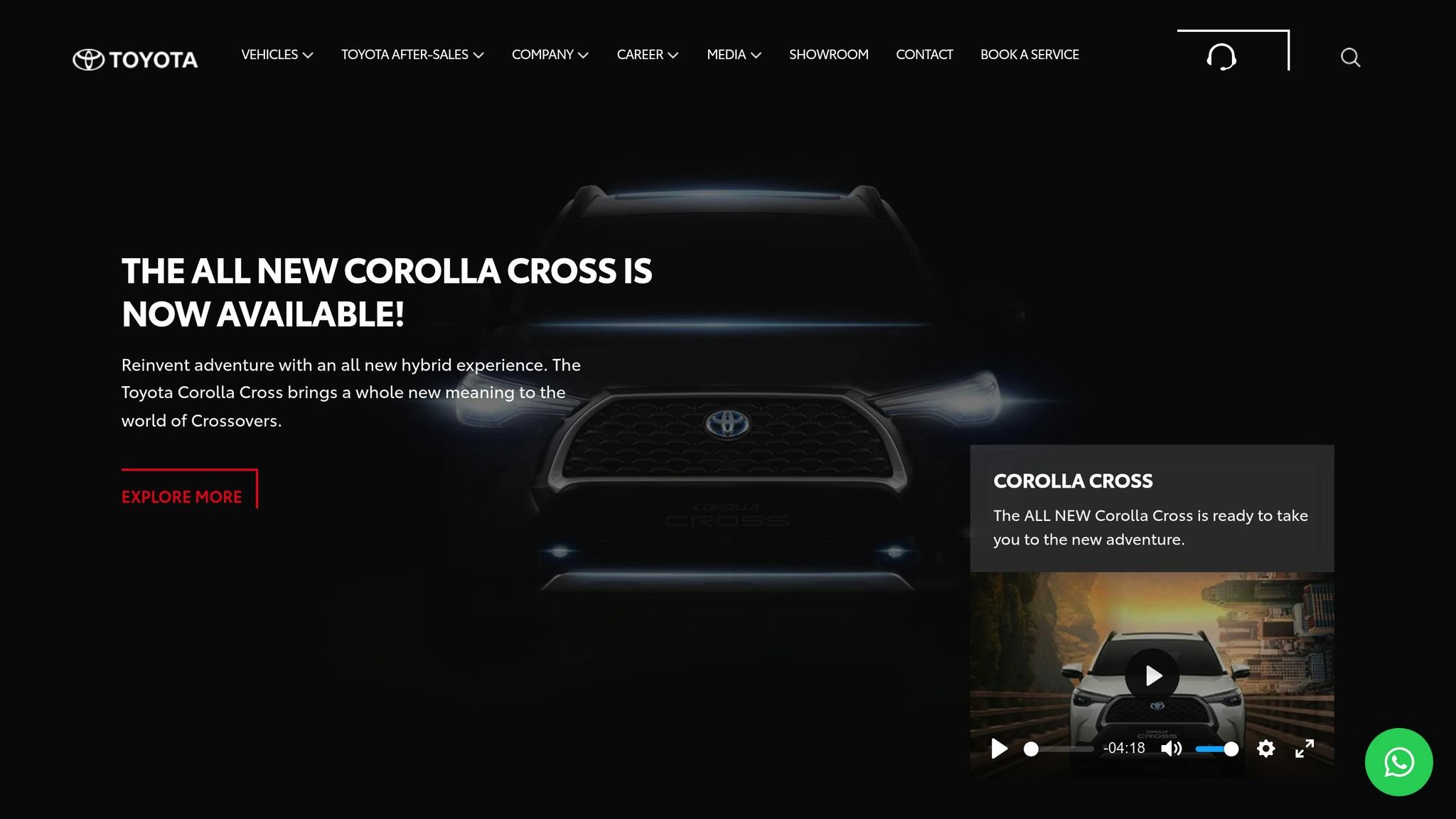
Toyota holds an impressive grip on Bangladesh’s automotive market. The Japanese carmaker commands a staggering 86% of all car advertisements on major platforms like Bikroy, solidifying its position as the market leader. This dominance reflects strong consumer trust and unwavering brand loyalty.
Toyota’s success stems from its reputation for reliability, low maintenance costs, and high resale value. In a market where 59% of car listings are for reconditioned vehicles, these qualities are especially appealing to buyers looking for dependable, long-term investments.
Popular Toyota Models and Pricing
Toyota offers a range of models in Bangladesh, catering to diverse preferences and budgets. The Toyota Corolla remains a top pick, priced between ৳25,00,000 and ৳35,00,000. This model fits squarely into the most popular price range, as 26% of car advertisements fall within the ৳20–30 lakh bracket.
For buyers on a tighter budget, the Toyota Vitz is available at around ৳13,00,000, while the fuel-efficient Toyota Aqua hybrid comes in at approximately ৳15,00,000. Mid-range options include the Toyota Allion, priced at about ৳24,00,000, and the versatile Toyota Fielder, which ranges from ৳16,00,000 to ৳22,00,000. At the premium end, the Toyota Harrier is priced between ৳48,00,000 and ৳75,00,000. For those seeking luxury, the Toyota Vellfire is available at approximately ৳2,00,00,000, while the flagship Toyota Land Cruiser 300 commands a price of around ৳3,00,00,000. This broad lineup ensures Toyota appeals to a wide spectrum of buyers.
Market Positioning and Consumer Appeal
Toyota’s offerings align perfectly with the preferences of Bangladeshi car buyers. Sedans dominate the market, accounting for 36% of all vehicle listings, which highlights the demand for fuel-efficient, family-friendly cars. Models like the Corolla, Axio, and Allion cater directly to this need. Additionally, with only 1% of listings featuring brand-new vehicles, Toyota’s reputation for durability makes its reconditioned cars highly desirable.
"Reliability and longevity. None of these ever caused me major repairs."
– Genette Tylerson, Former Automobile Transporter
These factors showcase why Toyota consistently resonates with local buyers, setting the stage for a closer look at its advantages and drawbacks.
Advantages and Disadvantages
Owning a Toyota in Bangladesh comes with clear benefits, though there are a few trade-offs. The key advantage is the brand’s long-standing reputation for reliability and durability, ensuring years of trouble-free performance. Owners also praise Toyota cars for their quiet operation, smooth rides, and fuel efficiency.
On the downside, Toyota vehicles are sometimes criticized for being less exciting to drive, offering functionality over flair. Additionally, top-trim models can be expensive, approaching luxury car price points, and the standard warranty coverage is not as extensive as some competitors. However, Toyota’s commitment to the Bangladeshi market is evident, with the Toyota Tsusho Corporation announcing a new business structure in the country, effective 1st July 2025, aimed at improving operations and maintaining its leadership position.
For Bangladeshi buyers, Toyota remains a dependable choice, offering long-term value in a market that prioritizes practicality and reliability.
2. Honda
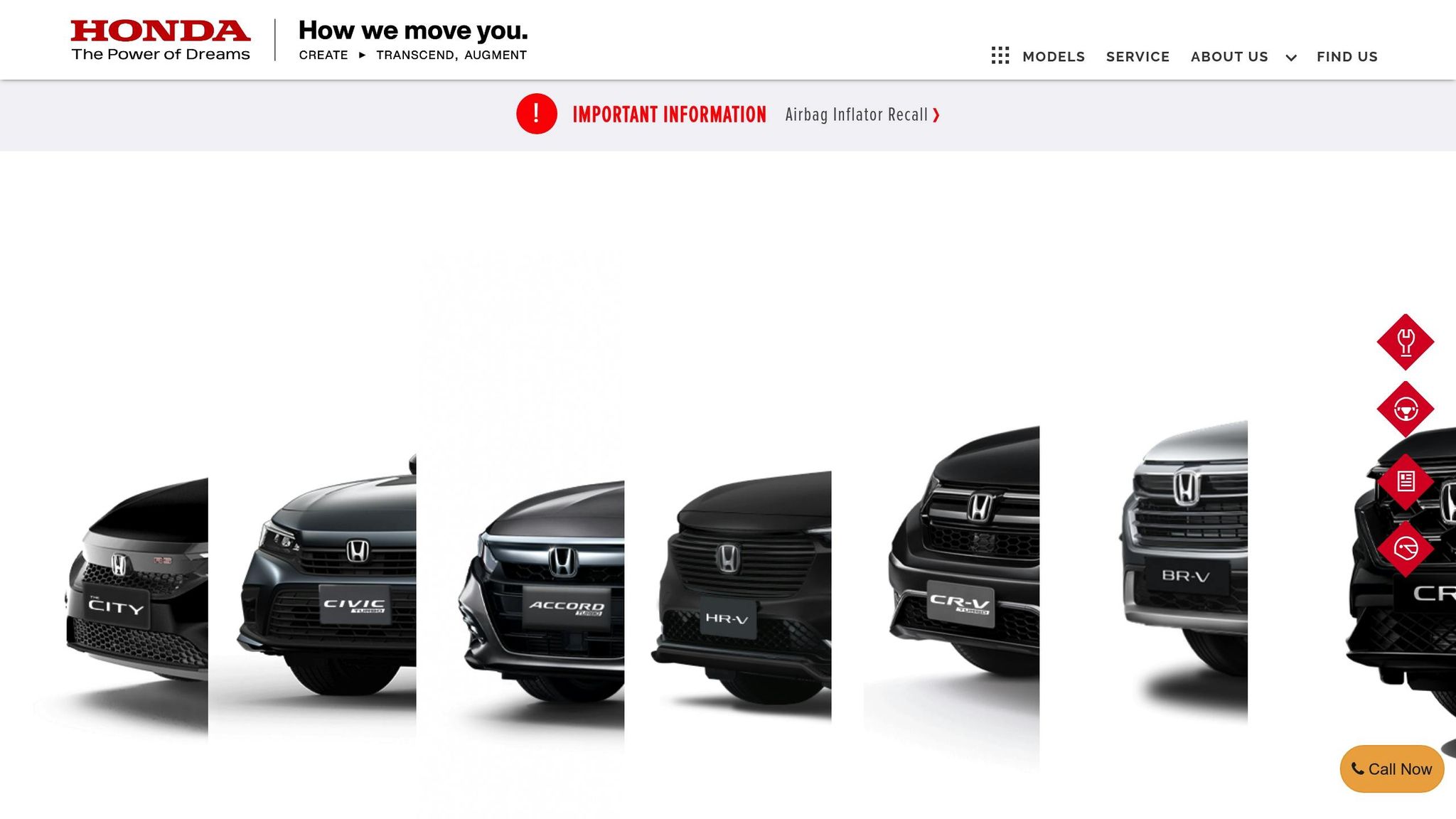
Honda holds the fourth spot among the best-selling car brands in Bangladesh as of 2021. The Japanese automaker has earned the trust of Bangladeshi consumers by consistently delivering quality engineering and advanced features.
Honda’s price range in Bangladesh spans from ৳25,00,000 to over ৳70,00,000, putting it in direct competition with Toyota’s mid-to-high-end models. This pricing strategy aligns with market trends, as 25% of car advertisements fall within the ৳30-40 lakh range, a segment where many Honda models are positioned. Let’s take a closer look at some of Honda’s standout models and their pricing.
Popular Honda Models and Pricing
Honda offers a variety of models that resonate with Bangladeshi buyers. The Honda Civic, a sleek and reliable sedan, is priced between ৳42,70,000 and ৳52,32,580. Its combination of stylish design and dependable performance makes it a popular choice.
In the SUV category, the Honda HR-V caters to urban drivers with its compact size and practicality. Prices for this model range from ৳35,50,000 to ৳45,00,000. Meanwhile, the Honda CR-V, a flagship SUV, has long been celebrated for its versatile performance and advanced features.
In May 2024, DHS Motors Limited, Honda’s authorised distributor in Bangladesh, unveiled the latest 2024 Honda CR-V. This updated model, priced at ৳89,00,000 without registration, comes with a two-year or 20,000 km warranty. Key upgrades include modern LED headlights, a 9-inch infotainment system compatible with Apple CarPlay and Android Auto, and a premium 12-speaker Bose sound system.
Honda’s lineup also features models like the City, Civic Turbo, Accord Turbo, and New BR-V, offering choices across various vehicle categories.
Market Positioning and Consumer Appeal
Honda’s diverse range of vehicles is tailored to meet the needs of urban buyers, offering a mix of reliability, efficiency, and advanced technology. Known for producing fuel-efficient and durable vehicles, Honda has successfully carved out a niche in Bangladesh’s market.
With 24% of car advertisements priced above ৳40 lakh, Honda’s premium models like the CR-V and Accord Turbo attract buyers seeking cutting-edge technology and superior build quality. These models are especially appealing to those willing to invest in vehicles that offer long-term value.
Honda’s reputation for combining comfort, innovation, and dependable performance makes it a strong contender in Bangladesh, where reconditioned cars dominate the market. Its vehicles not only hold their value over time but also cater to the preferences of a growing urban customer base.
3. Nissan
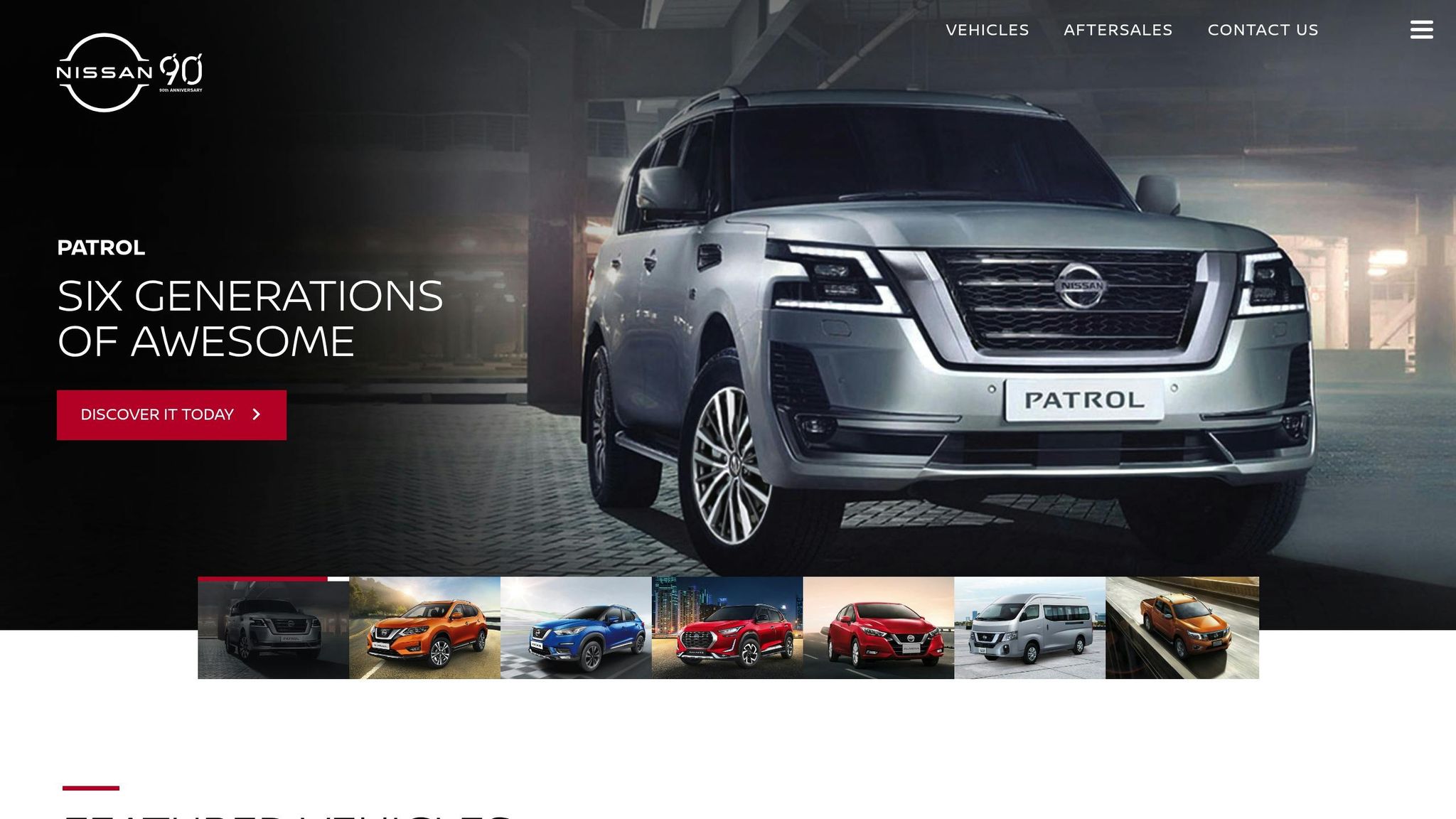
Nissan holds the third spot among Bangladesh’s best-selling car brands, capturing 3% of the car advertisement market share. Positioned just behind Toyota and Honda, Nissan has built a strong reputation for reliability and fuel efficiency, earning it a loyal customer base. This solid standing makes its range of models worth a closer look.
Nissan’s growth in Bangladesh is largely fuelled by the demand for quality reconditioned vehicles – 59% of its listings fall into this category. Additionally, 95% of its models are imported from Japan, appealing to buyers who prioritise cost-effectiveness and reliability.
Popular Nissan Models and Pricing
Nissan offers a variety of models in Bangladesh, from compact sedans to sturdy SUVs, catering to the mid-to-premium price segments. The Nissan X-Trail, a popular SUV, is priced between ৳58,00,000 and ৳60,00,000.
For those seeking affordability, the Nissan Almera is available at a discounted price of ৳30,00,000. It comes with a 3-year/40,000 km warranty and four complimentary after-sales services, making it an attractive option in the ৳20–40 lakh price range. Other notable models include the compact SUV Nissan Magnite and the tech-savvy Rogue Rock Creek Edition 2025, priced at ৳36,30,000. With 51% of car listings in Bangladesh falling within the ৳20–40 lakh range, these models are well-positioned to meet consumer demand.
Market Positioning and Consumer Appeal
Nissan’s strategy in Bangladesh aligns with broader automotive trends. With 62% of car sale listings concentrated in Dhaka, the brand focuses on models designed for urban environments, appealing to city professionals and families alike.
Fuel efficiency is one of Nissan’s standout features. Models like the Almera deliver mileage comparable to many hybrids, a significant advantage given the rising fuel costs. Additionally, Japanese cars, including Nissan, are known for retaining their resale value, which adds to their appeal. The availability of spare parts and repair services across the country further strengthens Nissan’s position.
However, some models equipped with CVT transmissions have faced issues, emphasising the importance of regular maintenance. While this doesn’t overshadow Nissan’s reputation for reliability, it does highlight the need for proper upkeep.
The Nissan Magnite showcases the brand’s focus on quality and innovation. It has earned accolades such as BBC TopGear’s "Best Turnaround Vehicle in the Indian Market" and "Compact SUV of the Year 2021". These awards reflect the engineering standards that Bangladeshi consumers have come to trust. While Nissan offers excellent fuel efficiency and strong resale value, careful model selection and diligent maintenance remain key considerations, echoing broader trends in the market.
sbb-itb-a58e215
4. Mitsubishi
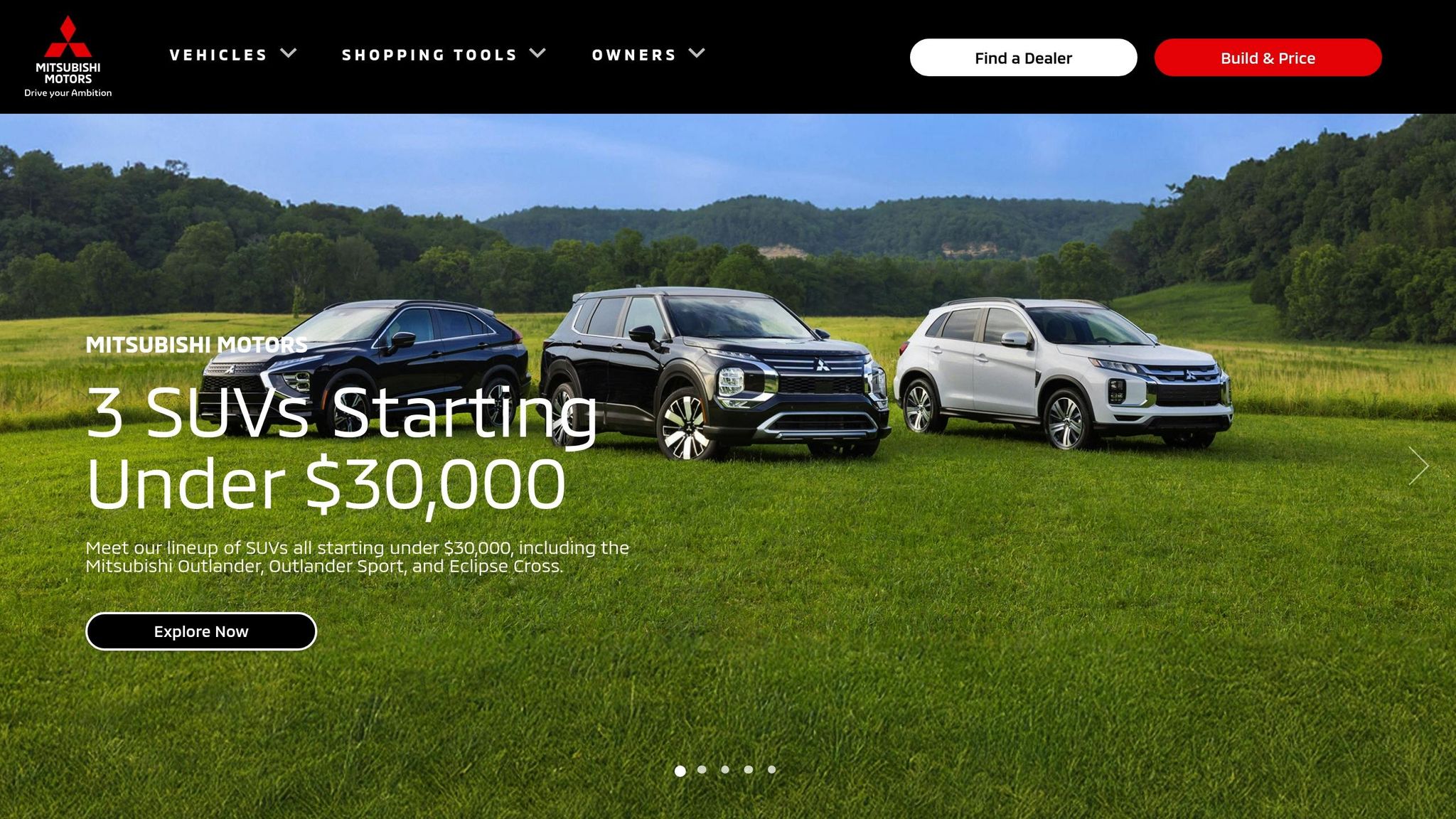
Mitsubishi takes the fourth spot among Bangladesh’s best-selling car brands, earning a reputation as a dependable and budget-friendly choice for local buyers. The Japanese automaker has carved out a strong presence in the Bangladeshi market by focusing on durability, fuel efficiency, and competitive pricing.
The key to Mitsubishi’s success lies in its ability to offer vehicles that strike a balance between cost-effectiveness and quality. Its diverse lineup caters to a wide range of consumers, from budget-conscious individuals to families in need of roomy MPVs and urban drivers seeking practical SUVs. Let’s dive into some of Mitsubishi’s standout models and their pricing.
Popular Mitsubishi Models and Pricing
Mitsubishi’s lineup in Bangladesh features everything from affordable sedans to premium SUVs. For first-time car buyers, the Mitsubishi Attrage stands out as the most economical option, priced between ৳23,16,500 and ৳25,16,500.
Families looking for a spacious vehicle often turn to the Mitsubishi Xpander, a locally manufactured seven-seater MPV. Priced between ৳32,00,000 and ৳46,00,000, the Xpander competes directly with models like the Toyota Avanza, offering great value in the MPV segment [35,36].
On the SUV front, the Mitsubishi Outlander is a top choice, with prices ranging from ৳49,00,000 to ৳50,00,000 depending on the variant. For those leaning toward eco-friendly options, the hybrid Outlander PHEV is available for approximately ৳60,00,000 to ৳62,00,000 [35,36].
For commercial needs, the Mitsubishi L200 pickup truck is a reliable workhorse. Priced between ৳59,34,000 and ৳60,34,000, it’s a preferred choice for businesses and individuals who require a tough and dependable vehicle for cargo transport [34,36].
Market Positioning and Value Proposition
Mitsubishi’s approach in Bangladesh focuses on offering vehicles with lower lifetime costs. Globally, the brand ranks as the 6th most reliable among 32 manufacturers, with average annual repair costs of just $535. This reliability translates into reduced maintenance expenses for owners – an attractive feature for Bangladeshi buyers.
Safety is another area where Mitsubishi excels. The 2022 Mitsubishi Outlander earned the highest safety rating from the Insurance Institute for Highway Safety (IIHS), and the 2024 Eclipse Cross received a five-star overall safety rating from the National Highway Traffic Safety Administration (NHTSA). These accolades highlight the brand’s dedication to passenger safety, a crucial factor in Bangladesh’s challenging traffic conditions.
However, Mitsubishi vehicles are not without their challenges. Issues like transmission, engine, and electrical problems have been noted. Following the manufacturer’s maintenance schedule and opting for professional inspections before purchase can help minimize these risks [38,39].
Looking ahead, Mitsubishi is making bold moves in hybrid and electric vehicle technology. The company aims for electric and hybrid models to make up 50% of its global sales by 2030, signaling a strong commitment to a more sustainable future in the automotive industry.
5. Hyundai
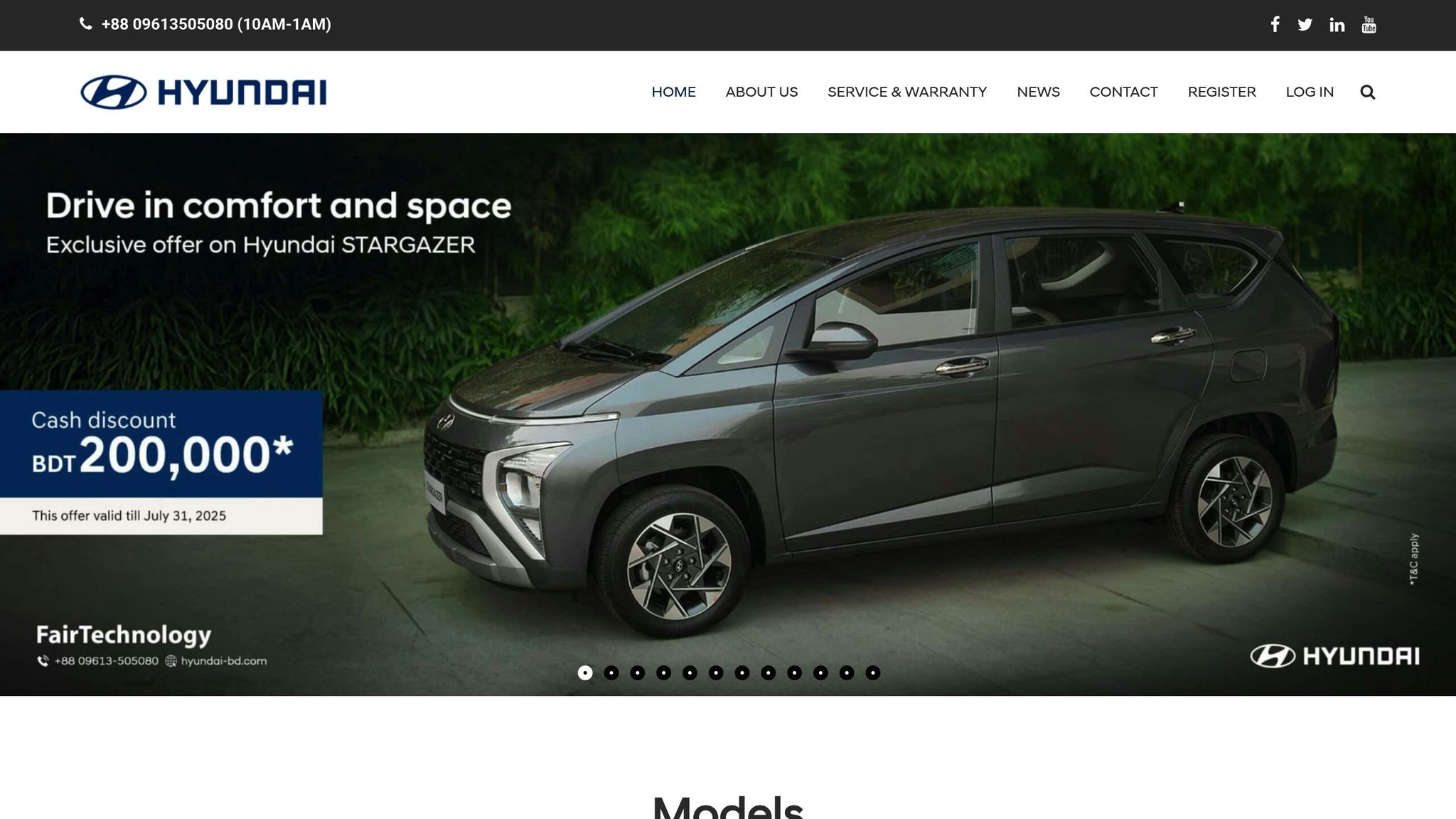
Hyundai holds the fifth spot globally and stands out as a leader in brand-new SUVs. Known for producing affordable and dependable vehicles, the South Korean automaker caters to a broad range of buyers.
In Bangladesh, Fair Technology Limited, a subsidiary of Fair Group, serves as the authorized distributor for Hyundai vehicles [43,49]. This local partnership not only lowers costs but also strengthens Hyundai’s presence in the market. By establishing a manufacturing facility in the country, Hyundai has been able to reduce prices and make its vehicles more accessible to Bangladeshi consumers. This strategic move supports a diverse lineup tailored to meet varying customer preferences.
Popular Hyundai Models and Pricing
Hyundai offers a variety of models in Bangladesh, catering to different budgets and preferences:
- Hyundai Creta: New models cost between ৳35,00,000 and ৳36,00,000, while used ones range from ৳30,00,000 to ৳35,00,000.
- Tucson: Known for its spacious interior, new models are priced at ৳53,00,000–৳65,00,000, with used options available for ৳40,00,000–৳50,00,000.
- Elantra: New models are priced at ৳45,49,000–৳46,49,000, while used versions range from ৳20,00,000 to ৳25,00,000.
- Palisade: Aimed at luxury buyers, this model costs between ৳75,00,000 and ৳95,00,000, competing with high-end vehicles like the Toyota Fortuner.
- Sonata: Priced between ৳47,00,000 and ৳48,00,000 for new models.
Local Manufacturing and Market Strategy
Hyundai’s commitment to Bangladesh became evident in January 2023, when Fair Technology Limited launched a manufacturing facility at the Bangabandhu Hi-Tech Park. This plant currently produces 3,000 Hyundai Creta SUVs annually, with plans to increase production to 10,000 units per year. Additionally, the facility has created approximately 300 jobs by assembling vehicles from completely knocked down (CKD) kits.
The local assembly has significantly reduced costs for buyers. For instance, the locally assembled Creta is about ৳7,00,000 cheaper than its imported version. Similarly, the Alcazar is expected to be priced at around ৳45,00,000 once local production begins, compared to ৳50,00,000 for imported units. These cost savings enhance Hyundai’s appeal and strengthen its position in the Bangladeshi market.
Market Position and Growth Prospects
Hyundai’s global reputation and success further bolster its growth in Bangladesh. The share of brand-new cars in the Bangladeshi market is projected to rise from 7% in 2016 to 16% by 2025, reflecting Hyundai’s growing influence. The overall automotive market in the country is also expected to grow at a compound annual growth rate (CAGR) of 9.6% through 2025.
Globally, Hyundai ranks as the third-largest automaker as of the second quarter of 2022. In India, it holds the second spot with a 16% market share for the fiscal year 2021–22. These achievements, combined with competitive pricing from local assembly, fuel-efficient engines tailored for local conditions, and modern features, make Hyundai a top choice for Bangladeshi consumers looking for dependable and up-to-date vehicles.
Brand Comparison: Pros and Cons
When it comes to choosing a car in Bangladesh, understanding what each brand brings to the table – and where they fall short – can make all the difference. The five leading car brands in the country each cater to different needs, offering their own set of perks and challenges.
| Brand | Market Share | Key Advantages | Main Disadvantages |
|---|---|---|---|
| Toyota | 86% | Reliable, widespread service network, high resale value | Higher upfront cost |
| Honda | 5% | Sturdy build, feature-packed, fuel-efficient | Fewer model options |
| Nissan | 3% | Tech-forward, comfortable interiors, good pricing | Smaller service network, lower resale value |
| Mitsubishi | 1% | Great SUVs, excellent off-road capabilities | Limited presence, fewer service centres |
| Hyundai | 1% | Affordable pricing, modern features | Limited service availability |
Breaking Down the Numbers
Toyota leads the pack with an 86% market share, and it’s easy to see why. Known for its reliability and extensive service network, Toyota vehicles also hold their value better than most. However, the higher initial cost can be a barrier for some buyers. Honda, while offering durable and fuel-efficient cars, has a narrower range of models compared to Toyota.
Nissan focuses on innovation and comfort at competitive prices, but its smaller service network can be a drawback, especially for those living outside major cities. Mitsubishi, with its reputation for rugged SUVs, appeals to off-road enthusiasts but struggles with limited service availability. Lastly, Hyundai stands out for its affordability and modern features, though its service network is still developing.
What Matters Most to Buyers?
In Bangladesh, fuel efficiency is a major concern, especially with rising fuel costs. Honda and Hyundai tend to excel in this area, while Toyota offers a solid balance of efficiency and reliability. On the other hand, Mitsubishi and Nissan prioritise performance and added features over fuel economy.
Service network accessibility is another critical factor. Toyota sets the standard with its well-established network, while Honda also maintains a strong presence. Nissan, Mitsubishi, and Hyundai are expanding their networks, but they still have some catching up to do. Resale value is another key consideration, with Toyota and Honda leading the way. Nissan, Mitsubishi, and Hyundai, despite their lower entry prices, generally see faster depreciation.
Spotlight on Reconditioned Cars
The reconditioned car market plays a significant role in Bangladesh, making up 59% of car listings. Toyota dominates this space, thanks to its strong reputation and reliability. Meanwhile, other brands are striving to gain traction in the new car segment.
"Toyota’s commitment to quality and innovation has made it a leader in the automotive industry." – Automotive Expert
Final Thoughts
For Bangladeshi buyers, the choice often boils down to fuel efficiency, long-term costs, and brand trust. With Toyota and Honda enjoying decades of proven reliability, Nissan leveraging its technological edge, Mitsubishi excelling in SUVs, and Hyundai focusing on affordability and features, each brand offers something unique to meet the diverse needs of the market.
Conclusion
Bangladesh’s automotive market reflects a deep-rooted trust in brands like Toyota, Honda, and Nissan. These companies have earned their reputation over decades by consistently delivering reliable vehicles, fuel efficiency, and dependable after-sales service.
Price sensitivity continues to shape buyer choices, with reconditioned vehicles remaining a popular option. These models, known for their value and dependability, dominate the market and underline the preference for affordability.
Looking ahead, the market is poised for notable growth. By 2025, the passenger car segment is expected to reach a value of US$641.5 million, with an annual growth rate of 2.16% projected through 2029. SUVs, in particular, are set to play a significant role, with their market value estimated at US$330.7 million in 2025.
Alongside economic factors, environmental awareness is becoming a key influence. Rising fuel costs and a growing focus on sustainability are driving interest in hybrid and electric vehicles. This shift challenges traditional manufacturers to expand their offerings and cater to evolving consumer priorities.
Urbanisation also remains a central force reshaping the market. With Dhaka accounting for 62% of all car sale advertisements and urban growth enhancing purchasing power, demand is tilting towards smart, fuel-efficient cars tailored for city life. Automakers that integrate connected features, improved fuel economy, and urban-friendly designs are better positioned to thrive.
The future of Bangladesh’s automotive market lies in blending time-tested reliability with modern innovations. Toyota’s extensive parts and service network gives it a strong edge, but the industry as a whole must innovate to meet the rising demand for eco-friendly and tech-savvy vehicles. The coming years will reveal whether traditional brand loyalty can withstand the pressures of technological shifts, environmental demands, and the rapid pace of urbanisation in this dynamic market.
FAQs
Why is Toyota the most popular car brand in Bangladesh?
Toyota holds the top spot as the most popular car brand in Bangladesh, thanks to its well-earned reputation for reliability, durability, and fuel efficiency – qualities highly appreciated by local buyers. These features make Toyota vehicles a smart investment for families and businesses alike.
What adds to its appeal is the affordable pricing and strong resale value that Toyota cars offer. On top of that, the widespread availability of spare parts and a large network of skilled mechanics familiar with Toyota models make maintenance straightforward and hassle-free. This mix of dependability, affordability, and convenience has firmly established Toyota as the preferred choice for car buyers across the country.
Why are reconditioned cars so popular in Bangladesh?
Reconditioned cars have carved out a significant place in Bangladesh, mainly because they offer affordable pricing and great value for money compared to brand-new vehicles. This affordability is closely tied to the country’s import duty policies, which make these cars a more practical choice for many buyers.
Among them, Japanese reconditioned cars stand out as a top preference. Known for their dependability, fuel efficiency, and long-lasting performance, these vehicles often come equipped with advanced features and superior build quality. This has earned them a strong reputation in the Bangladeshi market. Moreover, the increasing activity in the second-hand car market has made reconditioned vehicles even more appealing, providing buyers with a wide variety of options to match their preferences and budgets.
What impact will the shift to hybrid and electric vehicles have on Bangladesh’s car market?
The rising interest in hybrid and electric vehicles (EVs) is poised to reshape Bangladesh’s car market. By turning to cleaner energy alternatives like EVs, the country can reduce its reliance on fossil fuels and cut down carbon emissions, aligning with global efforts towards greener solutions. This shift might also inspire the use of more environmentally-friendly transportation options across Bangladesh.
That said, there are hurdles to overcome. The higher initial cost of EVs, limited availability of charging stations, and the complexities involved in importing these vehicles could slow their widespread adoption. On the other hand, hybrid cars present a more practical and cost-effective option for the local market and are likely to gain traction more quickly. Over time, this transformation has the potential to steer Bangladesh’s automotive sector towards cleaner and greener mobility solutions.
Related posts
- 10 Essential Tips for Buying a Toyota in Bangladesh
- Reconditioned vs Brand New Cars in Bangladesh: Which One Should You Buy?
- Latest Car Prices in Bangladesh – July 2025 Update
- EV Market in Bangladesh: Are Electric Cars the Future?

